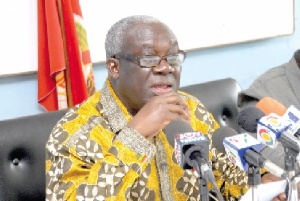Secretary-General of the Trades Union Congress (TUC), Kofi Asamoah, has said that Osagyefo Dr. Kwame Nkrumah will always be remembered by the TUC and the working class movement of Ghana for his abiding faith in and commitment to the working people.
He said Kwame Nkrumah was not a leader of the big and powerful, but a leader of the common people: the working men and women of Ghana.
Kofi Asamoah noted that Nkrumah made politics a matter for the working people in a manner that no other leader before or after him ever did. He cited the present TUC edifice as a gift bequeathed from Nkrumah’s CPP government in 1960, together with the Labour College.
The TUC Secretary-General was speaking on the topic ‘The Impact of the February, 24th 1966 Coup on Trade Unions’, organised by the Socialist Forum of Ghana to honour Osagyefo Dr. Kwame Nkrumah last week.
Mr. Asamoah said Nkrumah saw in the workers movement a key transformatory force for society and invested heavily in it -- by pursuing a vigorous policy of industrialisation, job-creation and education of the working people. The Seven-Year development Plan and corresponding Work and Happiness Programme was hinged on the workers movement with education and science as the transformative force, he added, since it gave working people and the TUC leadership a real stake in national development and policymaking.
However, with the fateful February 1966 coup, dark days began in the annals of the TUC movement’s history. This saw the aspirations of the Union movement shattered.
Asamoah opined that the Seven-Year Development Programme sought to transform Ghana from a country of shopkeepers and consumers into a showpiece modern industrialised economy in Africa – starting a period when there would be full employment and even a need to support deficit of labour from neighbouring African countries.
His State Farms, Asamoah observed, were to introduce modern scientific large-scale farming; and this was necessary to provide food and agricultural raw material for agro-processing. The Workers Brigade Programme was equally motivated by a commitment to create employment for working people, he emphasised.
He stated that the special relationship between the Unions and the CPP government changed the industrial relations landscape from one dominated by animosity to one of cordiality, which impacted positively on working conditions.
He noted that the CPP’s commitment to the welfare of workers was amply demonstrated by the number of ILO conventions adopted. Nkrumah ratified 34 ILO Conventions, and this represented over a third of all ILO conventions ratified by Ghana to the present day.
General News of Tuesday, 23 February 2016
Source: B&FT Online













